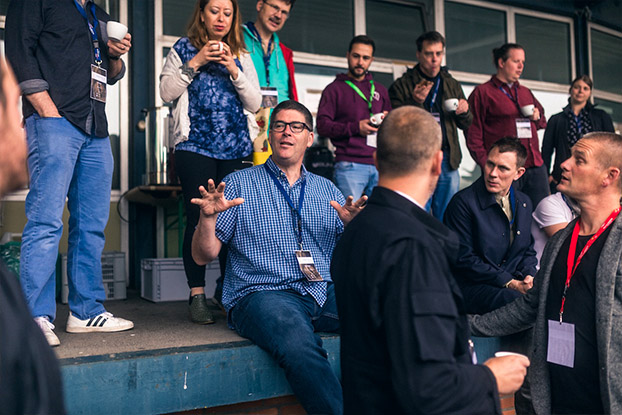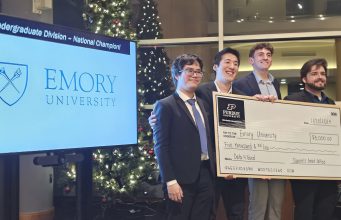Starting a new venture takes more than a great idea and business plan, it requires a solid pitch in order to raise interest and garner capital. That’s why each semester near the end of his Introduction to Entrepreneurship course, Charlie Goetz, senior lecturer in organization and management at Emory’s Goizueta Business School and a successful serial entrepreneur, brings in proven investors to put his student new venture pitches through their paces.

Tech investors Sig Mosley 68BBA of Mosley Ventures, LLC; Harold Brown, CEO and Chairman of Strategian; Ed Rieker 04MEMBA, CEO of Softlinc; and Larry Steele were among the 86 venture capitalists, entrepreneurs, angel investors and Emory alumni who came out on November 5 to listen and grill students about their presentations. Investors and entrepreneurs from previous years include Spanx Founder Sara Blakely, Eric Hartz, former president of S1; and Gerry Benjamin, co-founder of Atlanta Equity Investors.
As part of the class, twelve teams of students had just a few weeks to create a concept from scratch or flesh out an existing idea before they met the investors. Students performed a range of pre-work, including market research, developing financial projections, and of course, writing a business plan. Investors were encouraged to ask the tough questions, evaluate their performance, and share whether they would possibly invest in their idea. This year’s product offerings ranged from a new mobile app to solve parking issues, a new tool for purchasing real estate, and a maker of an Acai berry drink.
Unlike the popular TV show Shark Tank, where entrepreneurs face a panel of potential investors who can ask only four questions, these students present before an audience of investors who have ten minutes to question each team. In addition, the investors are armed with survey sheets that rate their performance and provide room to signify interest. The pressure and exchanges with the investors is intense, which is an intentional effort of the organizer
“It has to be real,” says Goetz about the process he wants students to experience. “I tell my investors there is no softball pitching here. Ask them the toughest questions you got.”
Indeed during the Q&A portion of the presentation for favor, an errand service to help busy working Moms and Dads, investors voiced their concern about the rate of return for the $700,000 ask. Also, they inquired how vendors would be vetted, and one investor even looked up the competitor on his iPhone to test the students’ understanding of the competitive landscape. Favor CEO Fatima Wyche 14MBA, a former consultant and an active Mom, partnered with the team’s COO, Dan Ziznewski 14MBA, to give a solid answer, but the real-time response to the pitch kept them on their toes.
Former students have gone on to start companies including Melanie Mueller 08MBA, the founder of Mel Boteri, a company that specializes in custom accessories for women and men, Grant Moss 11MBA, CEO of Adapt IP Ventures, which develops custom strategies to sell or license patents; and husband and wife team Matthew Guard 07MBA and Carolyn Guard 08MBA co-partners in Babiators, a children’s sunglasses maker, plus many more.
Entrepreneur Jordan Enoch 12MBA also understands how it feels to be a student presenter and an investor. He began judging presentations in 2006 and while running his first business, Campus Canteen in Athens, then presenting before judges as a student in 2011.
“I am very impressed by the passion of the students. Having been on the other side as a student, I know that only about a third of the ideas were developed before the class,” says Enoch. “Most of these groups have developed an entire product concept, business strategy, financial projections, and marketing plan all within 10 weeks.”
Now running his second company, Order Rover, which builds custom online ordering platforms for small and medium size restaurants, Enoch notes the coursework was invaluable.
“Goetz’s introductory course focuses on how to go from idea to launch. Though I had already started my own business before school, I leaned many critical tips, tactics and tools by taking this class,” adds Enoch. “We learned the best ways to research the industry, confirm your assumptions, raise capital, prove the concept, and market and sell—all on a shoestring budget. I still remember Goetz’s “Keep It Simple” mentality on a daily basis while dealing with business decisions.”

Nearly a year ago when Will Knochel 14MBA was trying to get a handle on all of his social media accounts, the seed of an idea for MyAgent was born. “My desire for a one-stop shop for all my social media accounts started the idea and the team grew that idea into a fun, potential company,” he adds.
Knochel says he was shocked and thrilled by the number of investors and successful entrepreneurs in the room, adding, “The most valuable part of the experience for me was the written feedback and responses.”
“The evaluations were thoughtful and considerably helpful in improving our understanding of what investors need/want to know about your company,” observes Knochel. “As an entrepreneur, it was tremendously helpful in identifying what areas of my own businesses to emphasize when meeting potential investors.”
“Although many people have great ideas,” Goetz stresses, “the overwhelming majority will never be funded unless the entrepreneur knows how to obtain the necessary funding.”
One product did pique the interest of an investor at the November event, which is why Goetz has included this investor presentation in his course for the last twelve years.
—Nicole Golston










